International service-learning programs
Global Hope (2010)
Liverpool Hope University (UK)
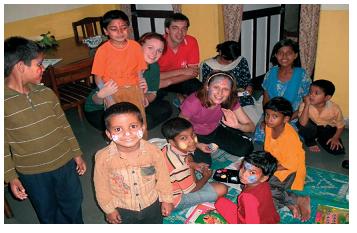 Global Hope provides international educational volunteering opportunities for staff and students of Liverpool Hope University in conjunction with the University’s international partners. Global Hope enables students and staff to take action as responsible global citizens and to lead educational activities in developing countries, thus participating in the promotion of a more just and sustainable world. Through the ever-increasing involvement of students and staff with Global Hope, collaboration with more partners has been possible, offering and sharing innovative approaches to teaching and learning. It started with the opening of the World Development Studies Centre in the early 1980s; the first feasibility studies took place in Africa, South America and Mexico in 1982. The first student placement was in Mexico, 1983. The vision of this work was to raise awareness of global problems through the active engagement with issues in the developing world by facilitating educational workshops led by Liverpool Hope University staff and supported by students. Since its inception, the program has grown to embrace working with a variety of partners across the globe in places as diverse as India, Malawi, South Africa, Nigeria, Uganda, Sri Lanka, Romania and Brazil. Visit Global Hope’s website>>
Global Hope provides international educational volunteering opportunities for staff and students of Liverpool Hope University in conjunction with the University’s international partners. Global Hope enables students and staff to take action as responsible global citizens and to lead educational activities in developing countries, thus participating in the promotion of a more just and sustainable world. Through the ever-increasing involvement of students and staff with Global Hope, collaboration with more partners has been possible, offering and sharing innovative approaches to teaching and learning. It started with the opening of the World Development Studies Centre in the early 1980s; the first feasibility studies took place in Africa, South America and Mexico in 1982. The first student placement was in Mexico, 1983. The vision of this work was to raise awareness of global problems through the active engagement with issues in the developing world by facilitating educational workshops led by Liverpool Hope University staff and supported by students. Since its inception, the program has grown to embrace working with a variety of partners across the globe in places as diverse as India, Malawi, South Africa, Nigeria, Uganda, Sri Lanka, Romania and Brazil. Visit Global Hope’s website>>
McMaster Cambodia Learning Community (2009)
Defiance College (USA)
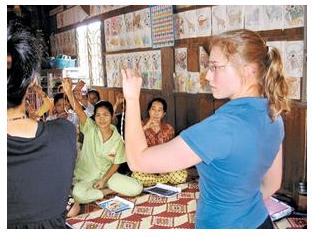 Although 30 years have passed since the genocide, Cambodia still struggles to recover from its devastating effects. Since 2004, students and faculty within the McMaster Cambodia Learning Community (MCLC) have traveled to the Kingdom to develop and conduct training workshops for teachers, counselors at the Cambodia Women’s Crisis Center (CWCC), and physicians in urban and rural areas. Defiance undergraduates have developed workshops in pre-algebra, geography of Southeast Asia, communicable diseases, basic math, and reading strategies, among others. At the CWCC, students have provided training in hygiene, infant care, and basic English for the food service industry. Pre-med undergraduates have presented training in the use of microscopes and methods to diagnose malaria and tuberculosis. All training materials written by the students are translated into Khmer and left. The program provides students with the opportunity to apply their domestic community engagement experiences in an international context. Learn more>>
Although 30 years have passed since the genocide, Cambodia still struggles to recover from its devastating effects. Since 2004, students and faculty within the McMaster Cambodia Learning Community (MCLC) have traveled to the Kingdom to develop and conduct training workshops for teachers, counselors at the Cambodia Women’s Crisis Center (CWCC), and physicians in urban and rural areas. Defiance undergraduates have developed workshops in pre-algebra, geography of Southeast Asia, communicable diseases, basic math, and reading strategies, among others. At the CWCC, students have provided training in hygiene, infant care, and basic English for the food service industry. Pre-med undergraduates have presented training in the use of microscopes and methods to diagnose malaria and tuberculosis. All training materials written by the students are translated into Khmer and left. The program provides students with the opportunity to apply their domestic community engagement experiences in an international context. Learn more>>
Ilahita Engineering Expedition (2009)
University of Melbourne (Australia)
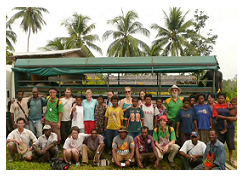
The Ilahita Engineering Expedition brings undergraduate engineering students from the University of Melbourne to Ilahita, an agglomerate of seven villages located in East Sepik province, in north-west Papua New Guinea. With a population of about 3000, Ilahita has grown quickly over the last decade and is now one of the largest remote villages in Papua New Guinea. Students work to address issues of rural water and sanitation, education, health and well-being while being exposing to international development. In 2008, Ilahita was supported by the University’s Knowledge Transfer program. The University of Melbourne’s Knowledge Transfer program is designed to build a strong relationship with the global community. The University values activities that target global, social, economic, environmental and cultural issues and result in a two-way exchange of information and understanding with the community. The Ilahita Engineering Expedition has been recognized as a model example of a Knowledge Transfer activity. View a Powerpoint presentation on Ilahita>>
Service Learning in the Global Community (2009)
University of Manitoba (Canada)
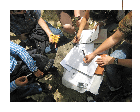 Service Learning in the Global Community connects communities from around the world in need of architectural design, with university students eager to apply their skills in a global setting. Through this unique service-learning program, Canadian university students travel abroad (thus far the program has traveled to Uganda and Turkey) and work alongside community hosts to design and construct a facility to meet their identified needs. While learning architectural skills in construction, materials, and design, the students also gain skills in cross-cultural communication, leadership and collaborative decision-making. The impetus for the course is a belief that collaboration across cultures, disciplines and borders, can contribute to the architecture of global citizenship. Learn more>>
Service Learning in the Global Community connects communities from around the world in need of architectural design, with university students eager to apply their skills in a global setting. Through this unique service-learning program, Canadian university students travel abroad (thus far the program has traveled to Uganda and Turkey) and work alongside community hosts to design and construct a facility to meet their identified needs. While learning architectural skills in construction, materials, and design, the students also gain skills in cross-cultural communication, leadership and collaborative decision-making. The impetus for the course is a belief that collaboration across cultures, disciplines and borders, can contribute to the architecture of global citizenship. Learn more>>
Village Adoption Project in Yunnan, China (2010, 2011)
Lingnan University, Hong Kong
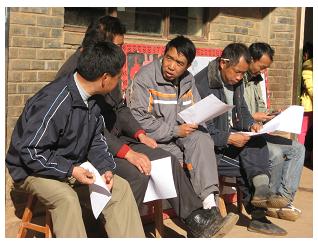 In November 2006, the multinational accounting firm Deloitte, together with Lingnan University in Hong Kong, launched a pilot for a sustainable development model for rural communities in China. They sought to do this by adopting Gezhangla village in Yunnan Province. This Project is the first public-private sector collaboration involving a Hong Kong higher learning institution and a commercial enterprise. Public education, health, and economic development are the primary issues addressed through this comprehensive program. These issues are significant concerns of the community because Gezhangla village is located in one of the poorest mountainous rural areas of Yunnan. Learn more>>
In November 2006, the multinational accounting firm Deloitte, together with Lingnan University in Hong Kong, launched a pilot for a sustainable development model for rural communities in China. They sought to do this by adopting Gezhangla village in Yunnan Province. This Project is the first public-private sector collaboration involving a Hong Kong higher learning institution and a commercial enterprise. Public education, health, and economic development are the primary issues addressed through this comprehensive program. These issues are significant concerns of the community because Gezhangla village is located in one of the poorest mountainous rural areas of Yunnan. Learn more>>